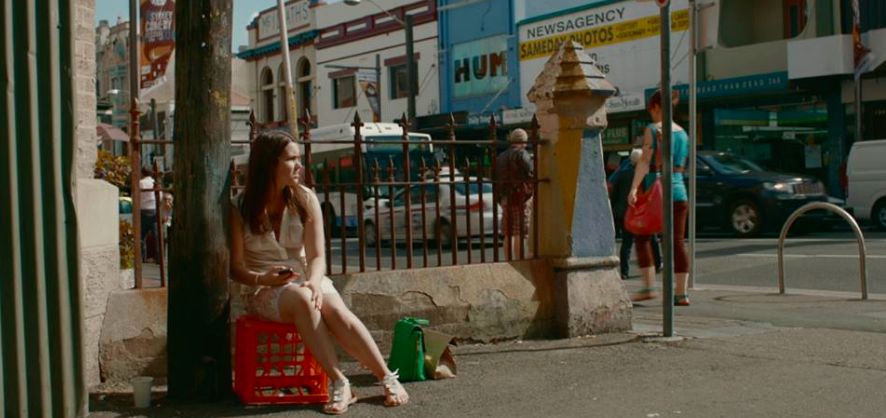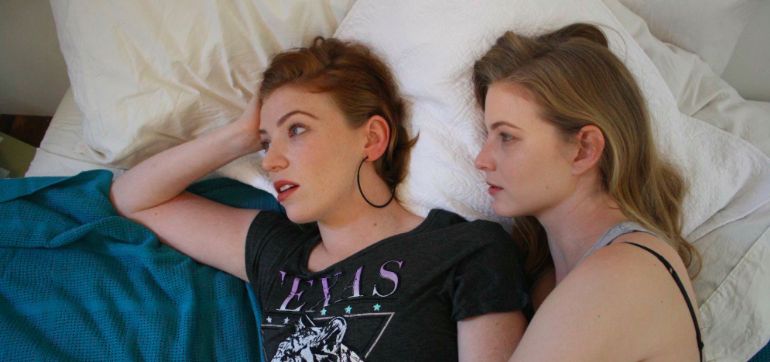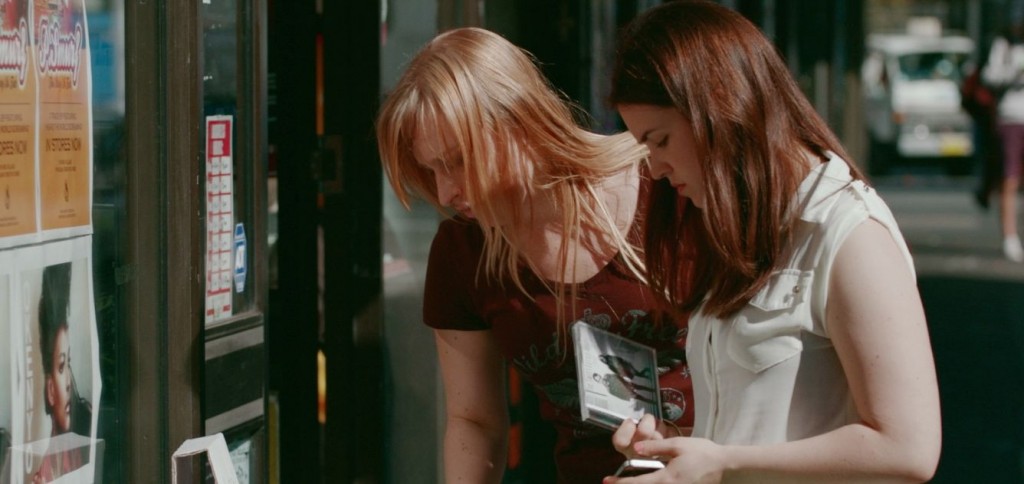Monica Zanetti, Writer/Actor
You both wrote and acted in the film – does either come more naturally to you? Do you gravitate more towards one or the other?
I’ve actually only ever trained as an actor. I’ve read my whole life, but I started writing as a vehicle to give myself a job. So it was during that process that I really fell in love with writing and I realised I understood story and the structure of writing, because I had read so much. So now I would say it was a 50/50 split. I love them both. I get to spend more time writing now, just because it’s easier to do in your own time and you don’t need anything to do it.
How important do you think the setting being Newtown is to the film? I’m given to understand the film was originally called New Town? Was there ever any doubt that it would be set in and around King Street? Was that the start for you?
It really was. Newtown really is like the third character in the film. It’s so vital. Particularly to the character of Caitlin. She’s not someone who has just moved there and hangs out there. She is who she is because she’s grown up in this King Street world. It’s appropriate for her to go approach a stranger, that’s not necessarily strange to her. It was so embedded in the script that there was never an alternative. Which unfortunately our location manager had a hard time with. Logistically it’s a nightmare to shoot. There are no public toilets, nowhere to park. There were even times when it would be suggested we’d shoot something in Stanmore, but me, Rosie and Jonnie were always like “nah, no way- it’s gotta be King Street.”
How long was the film in development? When did you start writing the script?
I had characters in my head for a while. I had the first scene. The first scene I wrote is where they both picked up the same CD, so I had that. So I could see both the characters very clearly but I didn’t know what their story was, I didn’t know where it was going to go. So in October 2012, the run of a play I had written had just finished and it was kind of like I woke up the next day, and it was like “Oh my God! Those two characters. I know exactly where this is going to go.” So I sat down and wrote the first draft which took me about four weeks. We shot in April 2013, so I guess that’s a good 6 months. I think Jonnie (the director) read it on draft number 4, and we shot on draft 14.
Right, that’s full on. The film screened here in Sydney as part of the Mardi Gras film festival? Do you consider it a queer or lesbian film? Or do you think it resists that kind of label?
We never did. I never did. Yes, Caitlin is obviously a lesbian. But I think what a lot of the feedback we’ve been getting, and what I’m really glad has been coming across is that the fact that Caitlin was a lesbian was kind of irrelevant to the story. She’s dealing with a lot more things, like pain and heartbreak, which are universal things. So I never thought of it as that kind of a film, but obviously the community has really embraced and a lot of the feedback that we’ve had is that they do feel like we’re not trying to make a statement about anything. It’s just these two characters in this world and one of them happens to be a lesbian. Which is starting to happen more, particularly with Orange is the New Black. It’s just putting it out there into mainstream viewing and allowing it to blend in with everything else. But it is wonderful that it’s being embraced by the community, we’re really stoked about that.
I think that it’s fair to say that the gay aspects of the film blend in with all the other things the film explores, like youth and heartbreak and illness. Carrying on from that, it feels like a very personal film – not to suggest that it’s autobiographical – but it’s very naturalised, and it feels very real. Was that intentional? Are those the kind of films you enjoy?
Yeah, a mix of things. There are definitely parts of me in there. I did have melanoma. I was very, very lucky. They found it in the early stages and I was okay. But it definitely opened my eyes up to the world of melanoma, which I knew nothing about until I was diagnosed. So then I had to learn everything off of Google, which no one should ever do. But once I got really involved in the community and met other young people, and people who were dealing with stage four melanoma and had just been told they have three months to live – the more I learned about the disease, the more shocking I found it. That theme of ‘how on earth does a young person come to terms with something that shocking?’ – three months isn’t even enough time to wrap your head around that. Getting to witness first hand how people respond to that, showed me a kind of bravery that just fascinated me and compelled me. I hadn’t seen melanoma represented in film or television before, which is bizarre because it’s Australia’s national cancer. So that was really important to me – the personal aspect of it. There are other characters in the film that have been influenced by other people that I’ve known. I’ve got a friend who loves any chance to get in a fountain, which is kind of where the fountain scene came from. The kind of films that I do love like, like Before Midnight and Richard Linklater’s other films, I love films where two characters change each other through conversation. Other young filmmakers, like obviously Lena Dunham but also Brit Marling who did Another Earth and Like Crazy was a big inspiration for me. The little films that can! I never had intentions to make a big film, I was going to make it however we could.
I definitely saw Linklater’s Before series resonating in the film, films that seems small because they’re only following these two people in one night, but are actually dealing with big dramatic themes.
Are you working on anything now? What’s next for you?
Yes, we have just shot the pilot for a television series that I have written called Young Labor, which is about the youth division of the Labor Party. Very different project, and that’s working with the brilliant Leon Ford as my director and Drew Bailey is producing it and he’s wonderful. So we’ve been very lucky. That’s still in the working stages. I have another feature film which is also in the process of trying to shop that around and get it attached to a director, as well. So those are the two things I’ve got happening.
Rosie Lourde, Producer
Jonnie tells me that you were involved with the casting of the film. I assume that Monica was already in place, but was it hard to find someone to play Leah?
I went to drama school with Zara so I knew her already. I had watched her grow as an actor over the last three and half years. So when I came on board with the project someone else was already set to play Leah, and as the project grew and it morphed, Leah’s character shifted and that actress wasn’t quite appropriate anymore. Zara had recently been in the States for pilot season and she’d come back and I got in contact with her to see if she was interested and available before we made any decisions and she was! So we decided to go with Zara.
It’s no secret that making an independent film in Australia is a tough job – how did you go about getting financing for the film?
The film was financed a couple of different ways. We were partially privately funded by family and friends, which was fantastic. And then on top of that we ran a couple of crowd funding campaigns. We had quite a few industry partnerships come on board, in part thanks to our wonderful executive producer Steve Jaggi. We also had a few community partnerships as well. I’m a Newtown local from way back so it was really great to be able to approach the businesses and see who would like to be involved. We got the Black Star Bakery involved, Holy Sheet, the Anglican Church helped us out as well. It was really a community project.
Was it difficult to get permits and the like to film on King Street?
The council was fantastic! Both Marrickville council and City Sydney council – because each end is a different council – we had a fantastic locations manager Keira Archer. She was tireless but also lovely to deal with, so that was great. The difficult thing about shooting on King Street was the noise!
Am I right in saying that the film premiered at the Austin Film Festival? What was that like?
We did, yeah! We were in competition for Best Narrative Feature. We ended up getting awarded an honourable mention, which they’ve never given out before. But the jury wanted to make sure we were recognised, so they asked if they would make a runner up which we were blown away by. The Aussie premiere was at the Mardi Gras Film Festival, and we’ll also be screening at the Melbourne Queer Film Festival, and that’s on the 22nd of March at 4pm. We haven’t done an afternoon screening before, so that will be interesting.
We’ve had lots and lots of invitations for the queer film festival circuit but because our film branches not just the queer side of things, it’s been difficult being able to get that respected in the wider circuit. But we’ve got some interesting things coming up though.
And you’ll be getting a theatrical release soon?
Yes! Dotted lines are almost being signed for a June release, so that’s still in the works.
Do you have any advice for young independent filmmakers trying to get funding or distribution?
That’s a tricky one. Make a unique story. That’s what we really found. Seeing how many films that are really out there, you need to make a film that stand out. Tell a story that you bring a different voice to. Did you like the film?
It did! I live in the area and I know what it’s like to have a night on King Street, or bump into an ex, so it really resonated with me.
Oh, good! We have had an amazing time. At the screening at the Mardi Gras Film Festival we got a standing ovation which they’ve never had before. It was the most overwhelming experience I think I’ve ever had. We’ve been so touched by how everyone is responding, we hope we can just get it out there further.
Jonnie Leahy, Director
So am I right in saying that Skin Deep is your first feature film? How did you get involved?
It is my first feature film. I came on board through the Director of Photography, Rodrigo Vidal Dawson, who is an old, dear friend of mine. Rod and I had worked together a lot in the past – he had directed a couple of videos I had directed and had shot them as well. He had the script and had met Monica (Zanetti). It was he who said to Mon – I’m not sure if you want to do the writing, acting and directing, that maybe she should give up one of them, and she chose directing and Mon and I met through him.
It was quite a full on thing for her to do that – hand over her baby, of sorts.
Yeah, it was incredibly brave. I think it was brave – but if i can be so bold – I think it was a really clever thing for her to do, because ultimately it helped the film.
How was it filming in Newtown? Was that a difficult process?
It was really fun – I’m a big fan of Newtown. It dictated a lot of things. Our wides became a 50mm lens, because we found that any wider we just had punters blocking it. Thankfully the way that Rod and I (and Rosie, of course) had discussed beforehand how we were going to cover it was a little bit more observational, so we were aware what was going to happen on the way in. It brought a definite energy to the entire piece which was really quite cool.
That’s Newtown for you, I guess.
Yeah, exactly! You could say that.
How long were you actually filming for?
10 days, so it was really fast. We ended up going away for a few months and doing some editing and realise some places where we’d like to flesh out the script a little, and so came back for two and a half days.
So how long did the overall process take?
I came on board in late February/early March 2013 and then we had our film sound mixed and all by June 2014. It wasn’t too quick, but having said that, we didn’t spend a lot of time in pre-production and developing, but we spent a lot of time in post.
I was wondering if you had any reservations about directing such a female centric story – or is all storytelling the same?
No, at no point did I ever think “this is all about women” – and it is, it really is. We had a female heavy cast and an incredibly female driven production department, a lot of the team were female. I felt very comfortable – I grew up with a single mum. I love strong women and have surrounded myself with them my entire life. So it never felt daunting or out of place. I was incredibly comfortable with the opinions of those around me and they were all incredibly supportive. But, I’ve lived in Newtown, I have been young, I have lived exactly the night that these guys had. So on that level, I think it’s pretty universal. That’s the beauty of Monica’s writing – the two protagonists happen to be female, but it’s not necessarily a female story. It’s about life and youth and going out there and grabbing it all and coming to terms with being young and living and all the daunts and joy that brings.


